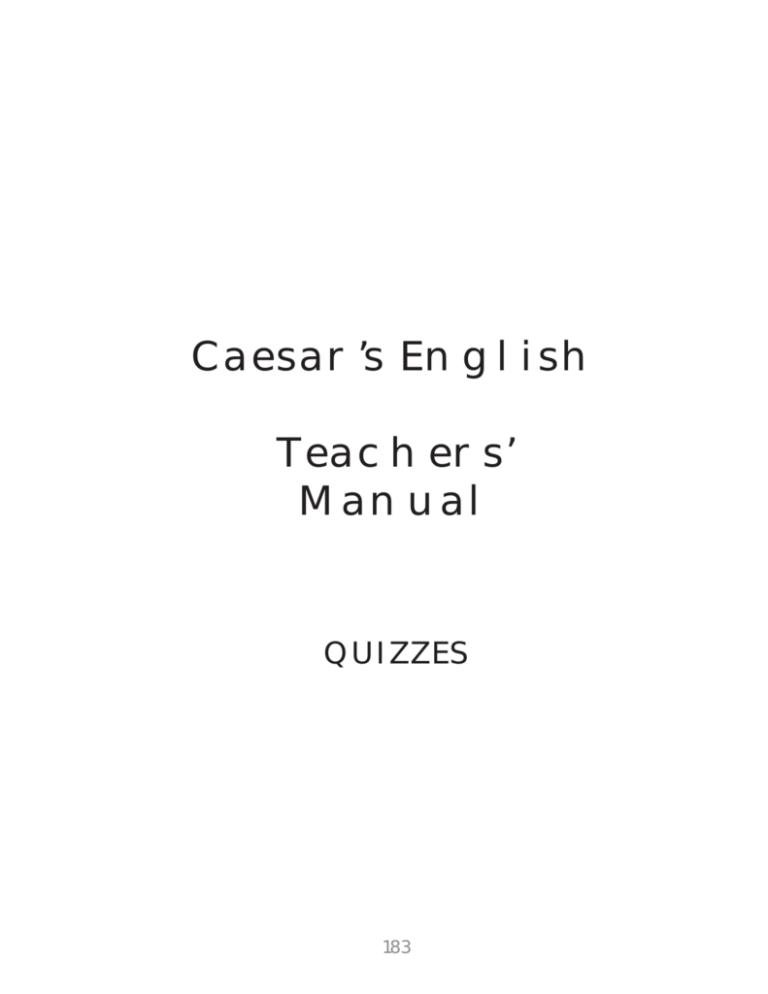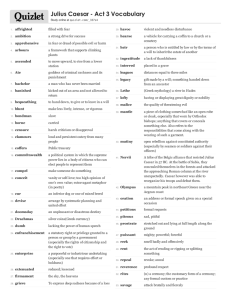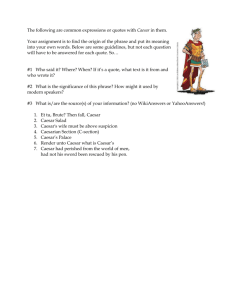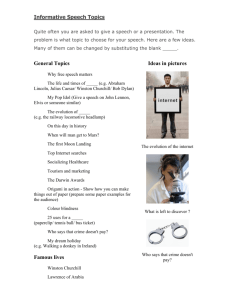advertisement

Caesar’s English Teachers’ Manual QUIZZES 183 Introduction for Teachers Caesar’s English II can be a stand-alone text, but it continues the work begun in Caesar’s English I, and serves as a strong bridge to the Word Within the Word vocabulary series. It is different from either of the other two, and has its own character. Compared to Caesar’s English I, Caesar’s English II shifts the focus more directly to the intellectual content of the language itself. Rome and Caesar are still present, but as slightly more of a backdrop. The vocabulary is still explored in the context of its ancient origin, and there is even more of an intense emphasis on the visual impact of Roman ruins, in the hope of creating a permanent bond in the students’ minds between the Latin-based words we use in English and the reality of their beginnings in the life of ancient Rome. But in place of some of the historical segments that were prominent in Caesar’s English I, where the historical foundation needed to be demonstrated and proved to the students, there are now more components that explore the vocabulary in depth. There are strong new sections that combine analogies, antonyms, and word context questions. There are two new components designed to teach students to think of vocabulary in terms of grammar. There is also a new component that challenges students to guess how famous writers have used the very words they are studying. The effect of these different exercises, taken as a group, is to cause the students to encounter the words and stems again, and again, and again, in different contexts, and at many levels of depth, and in different grammatical relationships. The fault of many vocabulary texts is that they go too fast, and give the students too transient a glimpse of the new words, and the purpose of Caesar’s English is to have student move their things in with these words, and stay a while. Caesar’s English II is profoundly interdisciplinary, combining deep examinations of words with rich grammatical connections, and doing so in a context of beautiful images of Roman ruins, a map of modern Italy and its surroundings, and historical quotations of Roman emperors and philosophers. This is complimented by passages from Caesar himself, and from Shakespeare’s Julius Caesar. It cannot be overemphasized how extraordinary it is that we can read a book by Julius Caesar, his Commentaries on the Gallic War; this is an opportunity to come eyeball to eyeball with one of history’s supreme military geniuses, and helps students to understand not only history but autobiography. We have labored to make this book beautiful. Beautiful matters. It is a core component of our intellectual lives, though no one dares say so. This effort involves not only the selection of the paintings in the book, but also such details as the type fonts, which are exclusively Times Roman and Trajan, two Roman fonts that resonate with the content. We have even changed to Roman numerals for the chapter titles. You are invited to use this book flexibly, creatively, and in concord with your own highest professional intuition. In creating it, we have attempted to create an array of wonderful options for you, and not a lockstep instruction. Have as much fun as possible. 184 Lesson Components How to Use the Features of Caesar’s English II Ancient Latin Stems Every odd-numbered lesson begins with a list of five Latin stems, with brief definitions and example words for each stem. These stems have been selected because they are Latin and because they are among the central, most important stems in English. The example words usually contain at least one word that is above grade level. Below the list of stems is a section that introduces each stem to the students. READ ALOUD: This section of stems and stem talk is best read aloud, slowly, with feeling, and one item at a time. Much of the content of this book is very advanced for elementary students—that is exactly the intent, to offer the most advanced vocabulary text ever assigned to elementary students—and it is therefore very important that the students’ first encounter with the words, author’s names, Roman terms, and so forth, be correct. We don’t want to let the students develop initial habits of mispronunciation. Careful reading aloud, with different students taking different paragraphs, and pauses between paragraphs for short comments and discussions, is optimal. Spanish in Caesar’s English II To the right of the stems there are definitions, example words, and examples words from Spanish. It is one of the most important messages of this book that English and Spanish are family members; we want students to see, over and over again, that the same stems appear in Spanish, and that the same advanced vocabulary words appear in Spanish forms, and that both of our languages owe much of their origin to the same Latin. Review Stems from Caesar’s English I Some teachers will have students who previously studied Caesar’s English I. Including those stems in this book’s lessons lets the teacher easily maintain the previous knowledge. Even students who did not previously study this content can easily incorporate it, since there are only five stems per segment. It would be easy to select some review stems and write them on the board during quizzes, and offer them as extra credit. Caesar’s Analogies, Antonyms, Context There is no reason why young students can not do analogies. It is good for them to understand the fundamental idea: analogies force you to focus on the invisible connection 185 between two words, rather than on the words themselves. In order to see the invisible middle, you have to understand each term clearly. Each stem lesson contains two analogies. These are best assigned either as homework or as small group problems, followed in either case by classroom review in which students present their reasoning. Keep in mind that very bright children often see relationships unnoticed by others, and highly intelligent answers may emerge that are not in agreement with the answer given in this book. In such a case, review the reasons for the book answer while still praising the insight of the student answer. Although antonyms are no longer included in some prominent tests, they are intellectually valuable. It will do students good to work them out, perhaps with a dictionary. The context questions give students another exposure to the stems as embodied in words, and strengthen their sense of proper usage. Advanced Word The Advanced Word segments of the stem lessons give students a chance to see a really advanced word, one that would never normally be studied by younger students in American schools. Again, these should be carefully read aloud and discussed. One good idea for the Advanced Words is to let them know that you will use them as extra point questions on the cumulative quizzes. You might just write on the blackboard, “What is the advanced word that means...” and let students supply the word you have defined. The Grammar of Vocabulary This is a new component that was not part of Caesar’s English I. It is a fact that correct usage of vocabulary is a function of grammar. Most words have forms that allow them to serve as different parts of speech, and so this section features one of the vocabulary words in its full grammar context, with parts of speech, parts of sentence, phrases, and clauses all analyzed. Even if the class is not up to speed with the grammar at the beginning, it will not take long to learn a lot of grammar, just from this segment, and by doing so to gain a far deeper understanding of the right usage of the words. This segment is complimented by the Caesar’s Usage segment, which gives students an opportunity to write sentences using the words in various ways. Julius Caesar, from his Commentaries on the Gallic Wars: Many students today may not even realize that they can read a book written by Julius Caesar, and yet for generations school children were introduced to the life of the mind by translating Caesar’s Commentaries on the Gallic Wars from Latin into English. The quotations here are another link to the historical language foundation, and have been selected to intrigue curious students, perhaps resulting in their doing further explorations on their own. One classroom idea is to follow up on these quotations or the ones in the posters with small research assignments, letting students show the class what else they 186 found out. We hope that collectively, the quotations from Julius Caesar will be a kind of extended book report that will entice some students into reading Caesar’s Commentaries. Excellent students for generations have done read Caesar, often in the original Latin. From William Shakespeare’s Julius Caesar New to this volume of Caesar’s English is the Shakespeare component. William Shakespeare’s Julius Caesar is the closest look that most students ever get to the story of Julius Caesar. By providing each lesson with a quotation from the play, we can create yet another interdisciplinary bond in the students minds, and develop their sense of curiosity not only about Caesar, but about Shakespeare’s play. For some students, these quotations will be the first lengthy passages they have ever read from Shakespeare, and they will begin to get a sense of the power of the language, the poetry of it, the mesmerizing use of words that Shakespeare employed. These passages are best read aloud, and discussed. Discussion Poster The Discussion Poster is intended for Socratic discussion. The teacher should present the poster to the students, either on the wall or as a projection of a transparency, and conduct a discussion of the idea, letting the students explore the idea in an open-ended way. No right answer is provided, and none should be advocated by the teacher. Rather, all students should be encouraged to think, to piggyback on others’ ideas, and to respect all other views. Some of the quotations are not so baffling that agreement will fail, but they will still allow for nuances and various qualities of description. Vocabulary from Latin The odd-numbered chapters, be it recalled, are based on Latin stems. The even numbered chapters that alternate with them do not focus on stems, but on words that reach American English from the distant shores of ancient Rome. These Latin-based words have all been identified by Michael Thompson’s Classic Words vocabulary research as among the central literary words in the English language. For various of their merits, these particular Latin-based words have distinguished histories in English, and can be found in the preponderance of great works in American and British English. Students who study these words will enjoy a greater ease with reading, leading to a greater fluency in general. The alternation of Latin stem chapters with Latin-based vocabulary chapters gives Caesar’s English II a nice rhythm that students will enjoy. The Vocabulary chapters begin with a short list of words with definitions, and then move to a series of short readings, one about each word in the list. These readings are intended to be read aloud. The teacher should read the first one, to model the style, which is slow and clear, pausing at the commas and periods, and emphasizing the life of the great quotes that are included in each reading. It is entirely appropriate to pause both during and after each reading to talk about the usages found, and to express enthusiasm for uses that 187 are creative or brilliant. The more that each reading is encountered in this way, rather than just read quickly in a monotone, the more it will transfer into the student’s thought. These readings are an especially good opportunity for intellectual leadership by the teacher, who can interject asides about famous authors or wonderful sentences, and liven the experience with personal contribution. Note: Some of the quotations have a slash / like that in the middle of the line. This means that the quote was poetry, and the slash represents where the new line began in the poem. Caesar’s Classic Words Challenge A new component in this text is the Classic Words Challenge. In this segment students are presented with a sentence by a famous author and asked to guess which of the following was the real word the author used. This is not a test; more than one word may work perfectly well. The challenge is to narrow down by eliminating unlikely choices, and then pick the one that feels most right in the context of the sentence. Inevitably, some of the results will be surprises to the students, who will then have the interesting experience of realizing what the author was really saying. Many of these sentences come from books that the students will not read for years, but it will do students no harm to become acquainted with famous names, and with many excellent sentences that illustrate great vocabulary used well. Caesar’s Sesquipedalian Story Each vocabulary lesson contains a Sesquipedalian Story, which combines all the big words that the students have learned into a single story. The word sesquipedalian means a-foot-and-a-half-long, and refers to BIG words. This should be read aloud in the class, two or three students taking turns, and then the teacher should go back through the story, sentence by sentence, having the students explain the meaning of each sentence. When this is done, one student should volunteer to retell the whole story in ordinary English. Part of the secret plan in the Sesquipedalian Story component is that if elementary students can read these stories, they can read anything. Caesar’s English Word Poster Here is a nice poster to copy and put on the wall. They can build up over time. If you want to adopt a word-of-the-day or week approach, this would help. Review for Cumulative Quiz Each lesson concludes with a cumulative list of all stems and vocabulary words, so that students can easily review for the quiz. It is also a visual statement of the knowledge they are accumulating. 188 Cumulative Quiz Each lesson contains a cumulative quiz that is found only in the teacher’s manual. Students will have to study all stems and words, and will have to learn the words both from word to definition and from definition to word, in order to do well on the quiz. 189 Caesar’s English • Lesson I Caesar’s Analogies: Find the most similar pairs. INTRACELLULAR : CELL :: a. advocate : oppose b. transfer : goods c. interior : car d. century : year ADVOCATE : OPPOSE :: a. complex : intricate b. combine : merge c. adhere : stick d. complete : partial Caesar’s Antonyms: Find the best opposite. ADVOCATE a. articulate b. revoke c. invoke d. resist COMPLEX a. elemental b. complete c. intricate d. ornate Caesar’s Context: Find the best word to complete the sentence. The senator was forced to __________ closely to the emperor’s instruction. a. adapt b. adhere c. advocate d. aquifer High on the mountainside above Rome, the __________ swayed in the wind. a. aquifers b. centurions c. conifers d. advocates Cicero could not in good conscience __________ for the Emperor’s new law. a. adapt b. adhere c. allocate d. advocate 190 Caesar’s Classic Words Challenge If we really want to get a feel for how words are used, we must see how great writers use words. In each case below, one of the choices was really the word used by the author in the sentence provided. For you, this is a word game. Your challenge is to guess which word the author really used. This is not a test; it really is a game, because more than one word choice may work perfectly well. See if you can use your sensitivity and intuition to guess which word the author used. You may need a dictionary! Notice that this challenge, though it appears similar to an ordinary sentence completion problem, really involves a different way of thinking. You will be very surprised when you see what some of the answers are. Finally, notice how the spelling of the vocabulary changes slightly when the word is used as a different part of speech. 1. From Joseph Heller’s Catch-22 Havermeyer had tiny bits of peanut brittle __________ to his lips. a. advocating b. completing c. adhering d. transferring 2. From George Orwell’s Animal Farm He set forth his reasons for __________ the building of the windmill. a. advocating b. adhering c. completing d. transferring 3. From Toni Morrison’s Song of Solomon The doctor had prescribed...hours of rest to be rigidly __________ to. a. complex b. advocated c. transferred d. adhered 191 Caesar’s English Lesson I Quiz For each sentence, define the stem that is in bold. 1. The centurion stood in silent attention. ___________________________ 2. Intramural sports were popular. ________________________________ 3. The complex strategy actually worked. ___________________________ 4. The legion was transferred to Gaul. _____________________________ 5. The senator advocated acceptance of the law. _____________________ Caesar’s English Lesson I Quiz 1. The centurion stood in silent attention. one hundred 2. Intramural sports were popular. within 3. The complex strategy actually worked. together 4. The legion was transferred to Gaul. carry 5. The senator advocated acceptance of the law. to 192 Caesar’s English • Lesson II Caesar’s Classic Words Challenge If we really want to get a feel for how words are used, we must see how great writers use words. In each case below, one of the choices was really the word used by the author in the sentence provided. For you, this is a word game. Your challenge is to guess which word the author really used. This is not a test; it really is a game, because more than one word choice may work perfectly well. See if you can use your sensitivity and intuition to guess which word the author used. You may need a dictionary! Notice that this challenge, though it appears similar to an ordinary sentence completion problem, really involves a different way of thinking. You will be very surprised when you see what some of the answers are. Finally, notice how the spelling of the vocabulary changes slightly when the word is used as a different part of speech. 1. From Bram Stoker’s Dracula Tell me of the house which you have __________ for me. a. placated b. procured c. retorted d. derided 2. From John Knowles’s A Separate Peace “The winter loves me,” he __________. a. advocated b. procured c. placated d. retorted 3. From Toni Morrison’s Song of Solomon It was a drama of wronged ladies and __________ hates. a. implacable b. vivacious c. retorted d. derisive 193 Caesar’s English Cumulative Quiz Lesson II A. Fill in the definition: 1. vivacious __________________________________________________ 2. procure ____________________________________________________ 3. derision ____________________________________________________ B. Write in the Caesar’s English Word: 4. a quick, clever reply __________________________________________ 5. to appease __________________________________________________ C. Define the stem in bold: 6. adapt ______________________________________________________ 7. transfer ____________________________________________________ 8. compete ___________________________________________________ 9. intracellular ________________________________________________ 10. century ____________________________________________________ 194 Caesar’s English Cumulative Quiz Lesson II A. Fill in the definition: 1. vivacious full of life 2. procure to acquire 3. derision ridicule B. Write in the Caesar’s English Word: 4. a quick, clever reply retort 5. to appease placate C. Define the stem in bold: 6. adapt to 7. transfer carry 8. compete together 9. intracellular within 10. century one hundred 195 Caesar’s English • Lesson III Caesar’s Analogies: Find the most similar pairs.. VITAL : MORBID :: a. patriarch : matriarch b. populous : people c. evidence : courtroom d. matrimony : mother EXPATRIATE : COUNTRY :: a. paternal : attitude b. revitalize : dilapidated c. abandon : ship d. provide : neglect Caesar’s Antonyms: Find the best opposite. REVITALIZE a. raze b. revive c. improve d. review VITAL a. revived b. vilify c. vivacious d. moribund Caesar’s Context: Find the best word to complete the sentence. Ovid fled Rome and lived as an ___________ far away, never to return. a. exception b. anarchist c. patriarch d. expatriot The venerable Cicero was the honored __________ of his family. a. patriarch b. expatriate c. population d. advocates Gradually, the dilapidated areas were __________ under the new policy. a. adapted b. adhered c. transferred d. revitalized 196 Caesar’s Classic Words Challenge If we really want to get a feel for how words are used, we must see how great writers use words. In each case below, one of the choices was really the word used by the author in the sentence provided. For you, this is a word game. Your challenge is to guess which word the author really used. This is not a test; it really is a game, because more than one word choice may work perfectly well. See if you can use your sensitivity and intuition to guess which word the author used. You may need a dictionary! Notice that this challenge, though it appears similar to an ordinary sentence completion problem, really involves a different way of thinking. You will be very surprised when you see what some of the answers are. Finally, notice how the spelling of the vocabulary changes slightly when the word is used as a different part of speech. 1. From Charles Dickens’s Great Expectations He was __________ for the term of his natural life. a. placated b. revitalized c. provided d. expatriated 2. From John Knowles’s A Separate Peace Then over all, cool and __________ [came] the six o’clock bell. a. populous b. paternal c. matriarchal d. revitalized 3. From F. Scott Fitzgerald’s Great Gatsby Tom’s voice groped unsuccessfully for the __________ note. a. popular b. paternal c. populous d. vital 197 Caesar’s English Cumulative Quiz Lesson III For each sentence, define the stem that is in bold. 1. A new vitality energized the city. ____________________________ 2. His paternal attitude was obvious. ___________________________ 3. The aging matriarch gave her decision. _______________________ 4. The population was divided. ________________________________ 5. Caesar provided for the men. ________________________________ 6. Two centuries passed. _____________________________________ 7. They combined forces._____________________________________ 8. Caesar’s adherents clamored louder. __________________________ 9. The intramural team won. __________________________________ 10. We inferred the real reason. _________________________________ For each sentence, define the word that is in bold. 11. The vivacious soldier laughed. ______________________________ 12. The general procured more arms. ____________________________ 13. The derision embarrassed the soldier. _________________________ 14. A sullen retort came immediately. ___________________________ 15. Caesar could not placate the crowd. __________________________ 198 Caesar’s English Cumulative Quiz Lesson III For each sentence, define the stem that is in bold. 1. A new vitality energized the city. life 2. His paternal attitude was obvious. father 3. The aging matriarch gave her decision. mother 4. The population was divided. people 5. Caesar provided for the men. look 6. Two centuries passed. one hundred 7. They combined forces. together 8. Caesar’s adherents clamored louder. to 9. The intramural team won. within 10. We inferred the real reason. carry For each sentence, define the word that is in bold. 11. The vivacious soldier laughed. full of life 12. The general procured more arms. acquired 13. The derision embarrassed the soldier. ridicule 14. A sullen retort came immediately. a quick, clever reply 15. Caesar could not placate the crowd. appease 199 Caesar’s English • Lesson IV Caesar’s Classic Words Challenge If we really want to get a feel for how words are used, we must see how great writers use words. In each case below, one of the choices was really the word used by the author in the sentence provided. For you, this is a word game. Your challenge is to guess which word the author really used. This is not a test; it really is a game, because more than one word choice may work perfectly well. See if you can use your sensitivity and intuition to guess which word the author used. You may need a dictionary! Notice that this challenge, though it appears similar to an ordinary sentence completion problem, really involves a different way of thinking. You will be very surprised when you see what some of the answers are. Finally, notice how the spelling of the vocabulary changes slightly when the word is used as a different part of speech. 1. From George Orwell’s 1984 He was...frail and bowed, with a long __________ nose. a. benevolent b. somber c. prostrate d. audible 2. From Alfred Lansing’s Endurance After supper that night there was a __________ quiet in the Ritz. a. audible b. profuse c. benevolent d. somber 3. From Ralph Ellison’s Invisible Man [It was] like a small voice...barely __________ in the roar of city sounds. a. somber b. profuse c. audible d. benevolent 200







